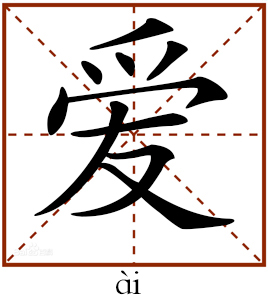Love

This character refers to love.
爱而不见 搔首踟蹰
ài ér bú xiàn sāo shǒu chí chú
Ai and xian are used as tongjia zi, or phonetic loan characters, a special phenomenon in the ancient Chinese writing system which used a character interchangeably for phonetically related characters. Ai means “to hide” and xian “to appear.” Sao means “to scratch” and shou refers to head. Chi chu means “to pace up and down.” This line depicts a person who scratches his head, pacing up and down anxiously because he cannot find his lover.
This is a line from a poem named Jing Nü, or A Demure Lady. “How lovely is the retiring girl!/ She was to await me at a corner of the wall./ Loving and not seeing her,/ I scratch my head, and am in perplexity./ How handsome is the retiring girl!/ She presented to me a red tube./ Bright is the red tube;--/ I delight in the beauty of the girl./ From the pasture lands she gave a shoot of the white grass,/ Truly elegant and rare./ It is not you, O grass, that are elegant;--/ You are the gift of an elegant girl” (trans. James Legge).
The poem is derived from the Shijing, or Book of Songs, the oldest existing collection of Chinese poetry. The content of the songs from Shijing, with discernible roots in both folk and court cultures, reflects a largely pre-Confucian agrarian society. One striking feature of the Shijing is the prominence of love and courtship songs. Many are bold and daring in expression. Jing Nü is a male-voiced love folk song dating to the Western Zhou Dynasty (1046–771 BCE).
At first, the male speaker expresses through his actions how he feels while waiting for his lover at a corner of the city wall—expectant and anxious. During his waiting, he constructs an image of his lover in his memory. He addressed the objects that were given to him by his lover that are symbolic extensions of the woman. The red tube refers to a woman’s writing brush or a red flower in ancient China. The white grass, also called cogon grass, was a symbol of love and marriage in ancient China. Both the “red tube” and the “white grass” were objects that could be obtained everywhere. However, they were precious for the male speaker, as they were gifts from his lover.
edited by REN GUANHONG

 PRINT
PRINT CLOSE
CLOSE